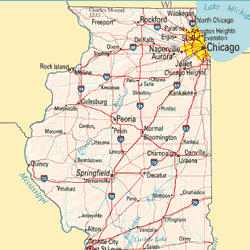Earlier this month the Illinois State Senate passed a bill that would allow five new land-based casinos to be built in the state.
That bill, known as Senate Bill 1739, still awaits approval in the Illinois House of Representatives and eventual approval by the state’s Democratic Governor, Pat Quinn, who has been generally unsupportive of expanding gambling in the Land of Lincoln in the past, having vetoed a similar measure earlier this spring.
Gambling Expansion a Hot Button Issue in the State
SB 1739 has proven to be quite a contentious issue in the state, spawning a spate of advertisements on television and radio both in favor of and opposing the measure. One particularly divisive portion of the measure, however, was removed from the legislation prior to its passage in the Illinois Senate chamber. We are, of course, talking about online gambling.
A major proponent of regulating online gambling in the Land of Lincoln has been Illinois State Senate President John Cullerton (D-Chicago), who reassured others in favor of passing allowing Illinoisans to place online wagers that the issue was not dead, but rather would be spun off and re-introduced as a new piece of legislation.
With time running rather short as the close of the current legislative session is set to take place on May 31, new details about that legislation came to light this week with the emergence of a draft of the bill.
Illinois Would Permit Many Types of Online Gambling
As with legislation that has already been passed in New Jersey and in Delaware, under the proposed bill a very wide range of online gambling will be permitted, from real money online poker games to Internet versions of classic casino games such as blackjack, roulette, and Let it Ride, and even sports-betting in instances in which making such bets is explicitly legal.
By contrast, in Nevada only online poker is permitted. Ultimate Poker made headlines at the beginning of the month by being the first company to launch regulated online poker games in the United States, and early reports from the company have been positive despite a few initial hiccups.
In the case of all four states, bettors must be a minimum age of twenty-one and will be required to be physically located within state borders when they access the sites; the same will be true in Illinois should the legislation be passed. Under the Illinois measure, tax rates will range from fifteen to twenty percent, however during the first year operators will receive a fifty percent tax break.
Illinois Chamber of Commerce Blasts Casino Bill
Whether or not there will be widespread support in Illinois for online wagering remains to be seen. As we mentioned above, the land-based casino expansion bill, which also calls for the installation of slot machines in the two Chicago-area airports, Midway and O’Hare, has proven to have some serious opponents, suggesting that Internet gambling is unlikely to be accomplished without a serious fight in the state.
Just this week, the Illinois Chamber of Commerce came out against the legislation, with the Chicago Tribune reporting that the group has submitted a letter to the General Assembly encouraging members not to pass it.
The Illinois Chamber of Commerce is concerned, in part, with upsetting what they see as the successful balance of casinos that currently exist in the state, essentially flooding Illinois with far too many casinos. The body also worries that owing to the many earmarks in SB1739, too little of the revenue would go toward education.
“Worse, the bill contains innumerable set-asides and earmarks that threaten to leave pennies on the dollar for education for suburban and downstate school districts,” the letter read.
For his part, Chicago Mayor Rahm Emanuel has vowed to use revenue generated by the Chicago casino that would be permitted under the new law to improve the city’s ailing schools. The Chicago Public School system, which is the nation’s third-largest, is embroiled in a bitter fight with residents and parents as they look to close a number of city schools as a cost-saving measure.

